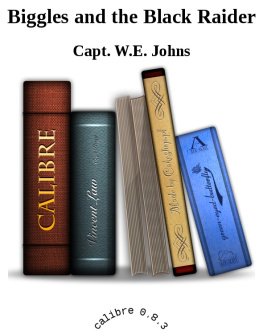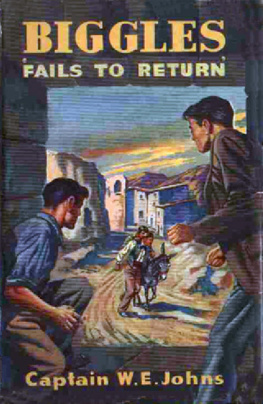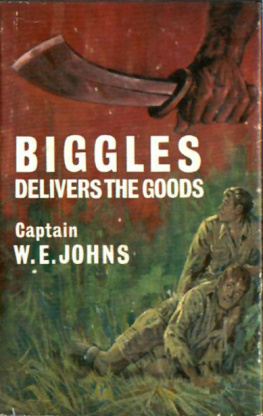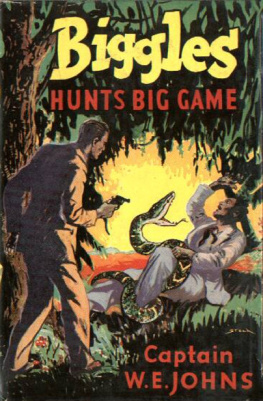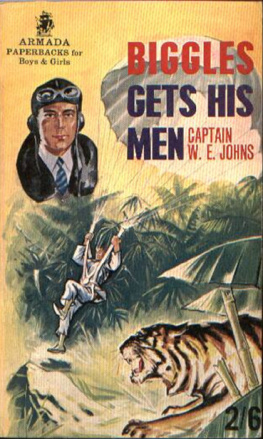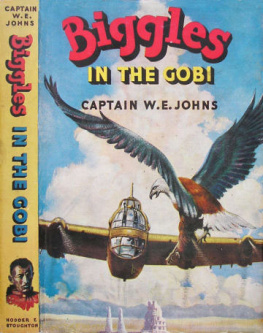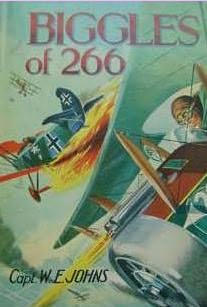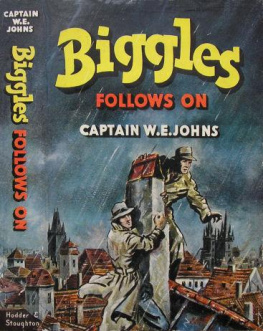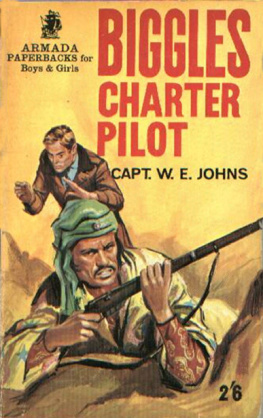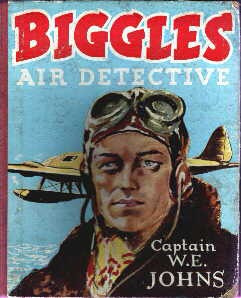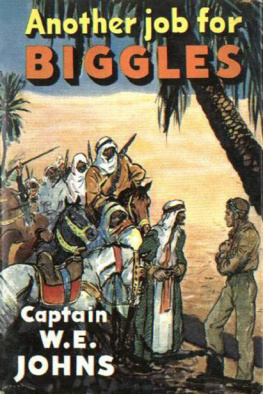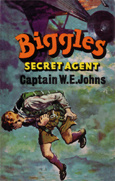Captain W.E. Johns - Biggles and the Black Raider
Here you can read online Captain W.E. Johns - Biggles and the Black Raider full text of the book (entire story) in english for free. Download pdf and epub, get meaning, cover and reviews about this ebook. year: 1953, publisher: Hodder and Stoughton, genre: Detective and thriller. Description of the work, (preface) as well as reviews are available. Best literature library LitArk.com created for fans of good reading and offers a wide selection of genres:
Romance novel
Science fiction
Adventure
Detective
Science
History
Home and family
Prose
Art
Politics
Computer
Non-fiction
Religion
Business
Children
Humor
Choose a favorite category and find really read worthwhile books. Enjoy immersion in the world of imagination, feel the emotions of the characters or learn something new for yourself, make an fascinating discovery.
- Book:Biggles and the Black Raider
- Author:
- Publisher:Hodder and Stoughton
- Genre:
- Year:1953
- Rating:5 / 5
- Favourites:Add to favourites
- Your mark:
- 100
- 1
- 2
- 3
- 4
- 5
Biggles and the Black Raider: summary, description and annotation
We offer to read an annotation, description, summary or preface (depends on what the author of the book "Biggles and the Black Raider" wrote himself). If you haven't found the necessary information about the book — write in the comments, we will try to find it.
Biggles and the Black Raider — read online for free the complete book (whole text) full work
Below is the text of the book, divided by pages. System saving the place of the last page read, allows you to conveniently read the book "Biggles and the Black Raider" online for free, without having to search again every time where you left off. Put a bookmark, and you can go to the page where you finished reading at any time.
Font size:
Interval:
Bookmark:
Home@page { margin-bottom: 5.000000pt; margin-top: 5.000000pt; }
CAPTAIN W.E. JOHNS
BIGGLES AND THE BLACK INVADER
First pu blished by Hodder & Stoughton, March, 1953
CHAPTER IDARK DEEDS
"Good morning, Bigglesworth. Come in. Take a pew, help yourself to cigarettes." Air Commodore Raymond, head of the special Air Section at Scotland yard, pushed the cigarette-box within easy reach of his chief operational pilot.
Biggles took a cigarette and flicked his lighter, glancing sideways at his chief with humour making little wrinkles round the corners of his eyes. "I have a feeling that such cheerful generosity so early in the morning is to prepare me for something more sinister than cigarettes."
"Quite right," acknowledged the Air Commodore. "As usual, I'm having a spot of bother."
"Where is the shoe pinching this time?"
"Africa."
"North, south, east or west?"
"I don't know."
"There's a lot of difference."
"So I believe." The Air Commodore smiled lugubriously. "Your best plan, I think, would be to start somewhere about the middle of the continent."
"And what am I to look for?"
"A black man."
"As there are quite a number of black men in Africa that shouldn't be difficult."
"I have a particular one in view."
"Ah! I was afraid of that. Is there something peculiar about him?"
"There are several peculiar things about him and none of them is nice. He stands six foot six and is broad in proportion. That should help you to recognise him."
"This heavyweight has, I take it, been making a nuisance of himself?"
"He has, and he still is. Nuisance is hardly the right word, though. He's a menace, and, as things are going, an extremely dangerous one. Take it easy for a minute while I tell you about him or as much as is known, which is little enough."
"I'm listening," stated Biggles.
The Air Commodore settled back in his chair. "The story begins roughly three years ago, when a name became the subject of native whispers. It was Cetezulu. It belonged, so rumour asserted, to a gigantic native who had dubbed himself with the somewhat ambitious title of the Black Elephant. The gentleman has now gone a little further. Today he styles himself the Black Elephant, Lord of Africa. Don't smile. There's nothing funny about it. The elephant part of the name was not ill-chosen. As you probably know, bull elephants have a habit of turning rogue. No rogue elephant, has done as much mischief as this one. Rogue elephants are notoriously cunning. The rogue with which we are concerned is as elusive as if he were inspired by the devil himself.
"At home, in the first place, we didn't take this gentleman seriously. Neither did the people, on the spot, if it comes to that. But they do now. So do we. For this scoundrel has embarked upon a career of wholesale murder and robbery, without parallel anywhere in the last fifty yearsand that's saying something. I will enlarge upon that in a moment. His avowed intention, as his adopted name implies, is to make himself master of Africa. In that respect he may be genuine. Dictatorship has become a sort of epidemic. The world is full of people who think they were born to run, first their own country, then the continent, and ultimately, no doubt, the universe. Here we have a black man bitten by this bug. Notice the nameCetezulu. It is obviously an assumed one, embodying the name of two of Africa's most famous black warriors: Cetewayo and Dinizulu. It is said that Cetezulu claims descent from Charca, the great Zulu king. Certain it is that he affects the old Zulu warrior's equipmentleopard-skin, ostrich feathers and so on. The few who have seen this fellow and survived are agreed: that he is a spectacular figure of a man."
"Where did he come from in the first place?" enquired Bigg1es.
"There are plenty of opinions about that; but the truth is, nobody knows for certain," answered the Air Commodore. "One story is that he was born in Kimberley and at one time worked in the mines there; but having killed a foreman, he bolted. Others say that he came from as far north as the Sudan. Some believe he was born in Kenya and was brought up at a Mission School there. But as I say; nobody knows for certain; although from the fact that he speaks English well we may assume that he was once in contact with white men." The Air Commodore smiled wryly. "Maybe it was from them that he got the dictator idea, if he is genuine in that. He may not be. That may be merely a cover for his villainy, to impress the credulous natives. But let us stick to what we know." The Air Commodore reached for a cigarette.
He resumed. "What we might call the first official appearance of this trouble-maker was in a native Reserve in Kenya, where he became conspicuous as an agitator determined to stir up strife with the workers. He overdid it when, having got into debt at the store, he hit the store-keeper on the head with a bottle and departed before the police could lay their hands on him. He was next heard of as a game poacher and some of the native methods of trapping wild animals were not pretty. The game ranger who went after him was murdered out of hand. From that time he has moved about Africa, leaving a trail of the most brutal murders. He has killed blacks and whites without discrimination, seizing their possessions and burning their homes. In a word, he has instigated a reign of terror which, if it goes on, will end in much of the country being depopulated. People are leaving their homes and going to the cities for protection. When I say he moves about Africa, I mean that literally. He strikes here, there and everywhere. Today he might be in Northern Rhodesia. In a week we may hear of him in Uganda. Within a fortnight he may be in the French or Belgian Congos, or Portuguese Angola."
"How does he manage that?"
The Air Commodore stubbed his cigarette. "It seems that he has developed the same technique as his namesake, the elephant. There are still a good many wild herds in Africa. While they behave themselves they are reasonably safe. Indeed, they are protected by law. But there are some bad hats among them who have tried to make a living the easy way by making night raids on the natives' mealie patches and banana plantations. The natives complain, not without reason, whereupon a white hunter goes out to administer punishment calculated to discourage this practice. In fact, some of the older animals are shot. The others know why. Unfortunately, they are not necessarily cured of their bad habits and several lessons may be necessary. In the end, it becomes a game of tip-and-run. A herd, knowing that punishment will follow a raid, puts as great a distance as possible between itself and the inevitable pursuit.
"These are the tactics employed by Cetezulu. He strikes, and runs, travelling only by night and hiding in thick cover by day. Which means, really, that he disappears. He moves far and fast. We have it on record that he has travelled fifty miles a day for a week. Imagine what that means. It's practically impossible to catch up with him. It may be a week, or even a month, before word of his latest crime reaches the authorities. In that time he may have moved hundreds of miles in any direction. With millions of square miles in which to operate it has so far been impossible to get near him. He is rarely seen, with the result that everybody, black and white, is on the jump, wondering if he is next on the list."
"I imagine he isn't running this racket single-handed?"
"Oh dear no. He started in a small way, but success has enlarged his gang until, so it is said, it numbers thirty or more. Dictators are never short of supporters to share in the loot. Men like Cetezulu attract to themselves others of their own kidney and therein lies the greatest danger. Unless something is soon done to end the career of this
Font size:
Interval:
Bookmark:
Similar books «Biggles and the Black Raider»
Look at similar books to Biggles and the Black Raider. We have selected literature similar in name and meaning in the hope of providing readers with more options to find new, interesting, not yet read works.
Discussion, reviews of the book Biggles and the Black Raider and just readers' own opinions. Leave your comments, write what you think about the work, its meaning or the main characters. Specify what exactly you liked and what you didn't like, and why you think so.

